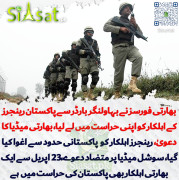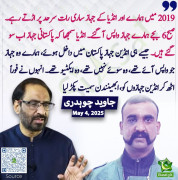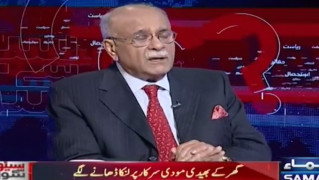You are using an out of date browser. It may not display this or other websites correctly.
You should upgrade or use an alternative browser.
You should upgrade or use an alternative browser.
آیات متشابہات کے بارے میں
- Thread starter saud491
- Start date
Mojo-jojo
Minister (2k+ posts)
[SIZE=+1] [/SIZE]
[SIZE=+1] [/SIZE]
[SIZE=+1] [/SIZE] [SIZE=+1] [/SIZE]Question: [SIZE=+1]In the Qur’an, there are many verses which are ambiguous and unclear. The Qur’an itself calls them the Mutashabihat (3:7). My question is: Why has the Almighty revealed verses whose meaning is vague or unclear? Isn’t guidance the real purpose of revelation? How can we be guided through such verses?[/SIZE]
[SIZE=+1] [/SIZE]Answer: [SIZE=+1]It needs to be clarified that the Mutashabihat of the Qur’an are verses in which things that are beyond human observation or comprehension are mentioned in the form of comparison (Tashbih) to things which we know in our own language and through our own experience. The actual purport conveyed by these verses is clear. However, human intellect is not equipped to grasp the reality to which they refer. For example, it is said in Surah Haaqah that the Almighty’s throne shall be lifted by eight angels on the Day of Judgement. Now we cannot know what the throne will be like, though we may have a slight idea since the word throne is also a common word in our language. Similarly, Surah Muddaththir says that there will be 19 sentinels guarding Hell. Again we cannot say why there will be 19 and what they will be like, though we know that the word 19 mentions a definite number. Consequently, verses which mention the blowing of spirit in Adam[/SIZE][SUP]1[/SUP][SIZE=+1], the birth of Jesus (sws) without a father[/SIZE][SUP]2[/SUP][SIZE=+1], nature of God’s actions like His sitting on a throne[/SIZE][SUP]3[/SUP][SIZE=+1], the blessings of Paradise like the nature of its milk and honey[/SIZE][SUP]4[/SUP][SIZE=+1], the torments of Hell like the tree of Zaqqum growing in Fire[/SIZE][SUP]5[/SUP][SIZE=+1] are examples of the Mutashabihat. The real purpose of such verses is that they become a trial and test for people since they must profess faith in them, without going after their reality. The Qur’an says:[/SIZE]
[SIZE=+1] It is evident from these details that the Mutashabihat of the Qur’an are verses the true reality of which human intellect is not capable of knowing since there can be no words in a language which can describe things yet to come in human observation. Consequently, words which may be similar to the concepts conveyed by these things of the unknown world are used to portray these details. It is incorrect to regard them as verses whose meaning is unclear or doubtful.[/SIZE]
| [SIZE=+2]The Mutashabihat of the Qur’an[/SIZE] |
[SIZE=+1] [/SIZE] [SIZE=+1] [/SIZE]Question: [SIZE=+1]In the Qur’an, there are many verses which are ambiguous and unclear. The Qur’an itself calls them the Mutashabihat (3:7). My question is: Why has the Almighty revealed verses whose meaning is vague or unclear? Isn’t guidance the real purpose of revelation? How can we be guided through such verses?[/SIZE]
[SIZE=+1] [/SIZE]Answer: [SIZE=+1]It needs to be clarified that the Mutashabihat of the Qur’an are verses in which things that are beyond human observation or comprehension are mentioned in the form of comparison (Tashbih) to things which we know in our own language and through our own experience. The actual purport conveyed by these verses is clear. However, human intellect is not equipped to grasp the reality to which they refer. For example, it is said in Surah Haaqah that the Almighty’s throne shall be lifted by eight angels on the Day of Judgement. Now we cannot know what the throne will be like, though we may have a slight idea since the word throne is also a common word in our language. Similarly, Surah Muddaththir says that there will be 19 sentinels guarding Hell. Again we cannot say why there will be 19 and what they will be like, though we know that the word 19 mentions a definite number. Consequently, verses which mention the blowing of spirit in Adam[/SIZE][SUP]1[/SUP][SIZE=+1], the birth of Jesus (sws) without a father[/SIZE][SUP]2[/SUP][SIZE=+1], nature of God’s actions like His sitting on a throne[/SIZE][SUP]3[/SUP][SIZE=+1], the blessings of Paradise like the nature of its milk and honey[/SIZE][SUP]4[/SUP][SIZE=+1], the torments of Hell like the tree of Zaqqum growing in Fire[/SIZE][SUP]5[/SUP][SIZE=+1] are examples of the Mutashabihat. The real purpose of such verses is that they become a trial and test for people since they must profess faith in them, without going after their reality. The Qur’an says:[/SIZE]
- [SIZE=+1]He it is Who has sent down to you the Book; in it are verses fundamental; they are the foundation of the book: others are Mutashabihat. But those in whose hearts is perversity follow the Mutashabihat seeking discord, and searching for its hidden meanings, but no one knows their true reality except Allah. And those who are firmly grounded in knowledge say: ‘We believe in the Book; the whole of it is from our Lord:’ and none will grasp the Message except men of understanding. (3:7)[/SIZE]
- [SIZE=+1]He [Joseph] said: This is the reality [in the interpretation] of my dream which I had seen before. (12:100)[/SIZE]
[SIZE=+1] It is evident from these details that the Mutashabihat of the Qur’an are verses the true reality of which human intellect is not capable of knowing since there can be no words in a language which can describe things yet to come in human observation. Consequently, words which may be similar to the concepts conveyed by these things of the unknown world are used to portray these details. It is incorrect to regard them as verses whose meaning is unclear or doubtful.[/SIZE]
جہاں تک میرے علم میں ہے علما حضرات اب تک یہی واضح نہیں کر سکے کے قرآن میں کونسی آیات متشابہ ھیں ،ان کے حوالے سے کوئی راہ عمل اختیار کرنا تو اگلا مرحلہ ہے .
Praise be to Allaah.Firstly:
Allaah says (interpretation of the meaning):
It is He Who has sent down to you (Muhammad صلى الله عليه وسلم) the Book (this Quraan). In it are Verses that are entirely clear, they are the foundations of the Book [and those are the Verses of Al-Ahkaam (commandments), Al-Faraaid (obligatory duties) and Al-Hudood (laws for the punishment of thieves, adulterers)]; and others not entirely clear. So as for those in whose hearts there is a deviation (from the truth) they follow that which is not entirely clear thereof, seeking Al-Fitnah (polytheism and trials), and seeking for its hidden meanings, but none knows its hidden meanings save Allaah. And those who are firmly grounded in knowledge say: We believe in it; the whole of it (clear and unclear Verses) are from our Lord. And none receive admonition except men of understanding
[Aal Imraan 3:7]
What is meant is that the Quraan contains verses that are entirely clear and verses that are not entirely clear. The entirely clear verses (muhkam) are those which are clear and concerning which there is no confusion; this applies to most of the verses of the Quraan. These verses are the foundations of the Book. As for the verses which are not entirely clear (mutashaabih) these are verses which may not be clear to some people, in exclusion to others. The scholars know them but the ignorant do not, and there are some which only Allaah knows.
Those who follow the truth refer the verses which are not entirely clear to the verses which are entirely clear, whereas those who follow deviation follow the verses which are not entirely clear, and they use the verses which are not entirely clear to contradict the verses which are entirely clear, for the purpose of creating confusion, distorting and misleading.
Ibn Katheer (may Allaah have mercy on him) said in his Tafseer (2/6): Allaah tells us that in the Quraan there are verses which are entirely clear, which are the foundation of the Book, i.e., they are clear in meaning, with no confusion for anyone; and there are other verses which are not entirely clear as to what they mean for many or some people. The one who refers that which is unclear to him to that which is clear, and uses the clear verses to understand what is not clear to him, will be guided. But the one who does the opposite will be misguided. Hence Allaah says: It is He Who has sent down to you (Muhammad صلى الله عليه وسلم) the Book (this Quraan). In it are Verses that are entirely clear, they are the foundations of the Book i.e., they are the root to which reference should be made in the event of confusion; and others not entirely clear i.e., they could be interpreted in accordance with those that are entirely clear or they could be interpreted in some other way, based on the wording and the way they are written, not according to the meaning.
So as for those in whose hearts there is a deviation, i.e., misguidance, and ignoring the truth in favour of falsehood, they follow that which is not entirely clear thereof i.e., they interpret that which is not entirely clear in such a way that allows them to distort it to suit their corrupt aims, because the wording could be interpreted in the way they want. But in the case of the verses which are entirely clear, they have no chance of doing that, so that is clear proof against them. Hence Allaah says: seeking Al-Fitnah (polytheism and trials) i.e., to misguide their followers and give them the impression that they are using evidence from the Quraan to support their bidah (innovation). This is evidence against them, not for them. It is similar to when the Christians argue that the Quraan says that Eesa (Jesus) is a Spirit from God and His Word that He bestowed upon Maryam (Mary), but they ignore the verses in which Allaah says (interpretation of the meaning):
He [Eesa (Jesus)] was not more than a slave. We granted Our Favour to him
[al-Zukhruf 43:59]
Verily, the likeness of Eesa (Jesus) before Allaah is the likeness of Adam. He created him from dust, then (He) said to him: Be! and he was
[Aal Imraan 3:59]
-- and other clear verses which unambiguously show that he was one of the creatures created by Allaah, and a slave of Allaah, and one of the Messengers of Allaah.
And the words and seeking for its hidden meanings mean, they distort it as they wish.
End quote.
Shaykh Ibn Uthaymeen (may Allaah have mercy on him) said:
Allaah, may He be blessed and exalted, has divided the Holy Quraan into two categories: the verses which are entirely clear and those which are not entirely clear. What is meant by those which are entirely clear is that the meaning is clear and obvious to everyone, like the heavens and earth, stars, mountains, trees, animals and so on. This is entirely clear because there is no ambiguity in its meaning. The verses which are not entirely clear are those of which the meaning is ambiguous or unknown to most people, and is known only to those who are well-versed in knowledge, such as some verses which are general in meaning and do not give details, but they are explained in detail in the Sunnah. An example is the verse in which Allaah says (interpretation of the meaning):
And perform As-Salaah [prayer]
[al-Baqarah 2:43].
How prayer is to be performed is not known from this verse; all that is known from it is that it is obligatory to perform prayer. But how that is to be done is known from other evidence. The wisdom behind the fact that the Qur'aan was revealed with verses of these two types is that this is a test, because those in whose hearts is deviation will follow that which is not entirely clear and will thus remain confused. But those who are well-versed in knowledge believe in all of it, both that which is not entirely clear and that which is entirely clear; they know that it is from Allaah and that there is no contradiction in it. An example of verses that are not entirely clear are the verses in which Allaah says (interpretation of the meaning):
There will then be (left) no Fitnah (excuses or statements or arguments) for them but to say: By Allaah, our Lord, we were not those who joined others in worship with Allaah
[al-Anaam 6:23].
On that day those who disbelieved and disobeyed the Messenger (Muhammad صلى الله عليه وسلم) will wish that they were buried in the earth, but they will never be able to hide a single fact from Allaah
[al-Nisa 4:42]
Someone may come along and say that they contradict one another. How can they say By Allaah, our Lord, we were not those who joined others in worship with Allaah, then it is said of them that they will never be able to hide a single fact from Allaah? They quote the verses against one another in order to confuse people. But those who are well-versed in knowledge say: It is all from Allaah and there is no contradiction in the words of Allaah. They said: The Day of Resurrection will be as long as fifty thousand years, and things will change throughout that Day. The first verse is applicable to one stage and the second verse is applicable to another.
End quote from Fataawa Noor ala al-Darb.
And he also said: As for the people of misguidance and deviance, they followed the verses which are not entirely clear and made them a cause to create doubt and suspicion, so they were misguided and misguided others. They imagined, on the basis of verses that are not entirely clear, something that is not befitting to Allaah or His Book or His Messenger.
An example of the first is the verses in which Allaah says (interpretation of the meaning): Verily, We give life to the dead [Yaa-Seen 36:12] and Verily, We, it is We Who have sent down the Dhikr (i.e. the Quraan) and surely, We will guard it (from corruption) [al-Hijr 15:9] and other verses in which Allaah attributes something to Himself using the plural pronoun (We). The Christians followed that which is not entirely clear and claimed a plurality of gods, saying that Allaah is the third of three, and they ignored that which is entirely clear and indicates that Allaah is One.
But those who are well-versed in knowledge interpreted the plural pronoun as being in terms of respect for the numerous attributes of Allaah and their greatness. They referred the verses that are not entirely clear to that which is entirely clear (interpretation of the meaning): And your Ilaah (God) is One Ilaah (God Allaah), Laa Ilaaha illa Huwa (there is none who has the right to be worshipped but He) [al-Baqarah 2:163]. So they say to the Christians: The claim you make is because of the confusion that you have, so Allaah has deemed you to be kaafirs (disbelievers) and has rejected your claim when you said that. Listen to the verse in which Allaah says (interpretation of the meaning): Surely, disbelievers are those who said: Allaah is the third of the three (in a Trinity). But there is no Ilaah (god) (none who has the right to be worshipped) but One Ilaah (God Allaah) [al-Maa'idah 5:73] i.e., they disbelieved when they said that God is the third of three.
An example of the second is the verses in which Allaah says to His Prophet (peace and blessings of Allaah be upon him) (interpretation of the meaning):
Verily, you (O Muhammad صلى الله عليه وسلم) guide not whom you like
[al-Qasas 28:56].
And
And verily, you (O Muhammad صلى الله عليه وسلم) are indeed guiding (mankind) to the Straight Path (i.e. Allaahs religion of Islamic Monotheism)
[al-Shoora 42:52].
In these two verses there is an imagined contradiction, so the one who has deviation in his heart may think that they contradict one another, because in the first verse there is a negation and in the second there is an affirmation. So he thinks that there is a contradiction in the Quraan.
But those who are well-versed in knowledge say that there is no contradiction between these two verses, because what is meant by guidance in the first verse is guidance by means of divine help or inspiration, which no one has control over except Allaah alone; neither the Messenger nor anyone else has any power over that. And what is meant by guidance in the second verse is guidance on the basis of evidence and proof, which may come from Allaah or from others, so it may come from the Messengers and their heirs, meaning the sincere scholars.
End quote from Majmoo Fataawa al-Shaykh Ibn Uthaymeen (4/186).
These are all examples of relative ambiguity which some people may not be able to understand, but those who are well-versed in knowledge understand it. As for the verses which are not entirely clear and which no one knows except Allaah, these have to do with matters such as the essence and nature of Allaahs attributes, or the essence of what is with Allaah of the delight of the people of Paradise and the torment for those who disobey Him. All of that is known to no one except Allaah.
Secondly:
Whoever is confused about any of the verses which are not entirely clear should try to understand it in the light of that which is entirely clear, if he is a scholar who is able to use evidence in order to reach conclusions. Otherwise he should ask the scholars, as Allaah says (interpretation of the meaning):
So ask of those who know the Scripture, if you know not
[al-Nahl 16:43].
Whatever the case, let him say (interpretation of the meaning): We believe in it; the whole of it (clear and unclear Verses) are from our Lord
[Aal Imraan 3:7].
Some of the heretics and deviants, in the past and in modern times, tried to seek out everything in the Qur'aan and Sunnah that is not entirely clear (al-mutashaabih), for the purpose of creating confusion and doubt.. But the scholars rose to this challenge and wrote beneficial books which refute these doubts. An example of that is the book which was written by Ibn Qutaybah (may Allaah have mercy on him), entitled Taweel Mukhtalif al-Hadeeth; and the book by Shaykh al-Ameen al-Shanqeeti (may Allaah have mercy on him) entitled Daf Eehaam al-Idtiraab an Aayil-Kitaab.
Praise be to Allaah, there is no contradiction between the verses of the Quraan, or between the Sunnah and the Quraan, because it is all from Allaah, and Allaah says (interpretation of the meaning):
Do they not then consider the Quraan carefully? Had it been from other than Allaah, they would surely, have found therein many a contradiction
[al-Nisa 4:82].
We ask Allaah to guide us and you and to grant us all beneficial knowledge and enable us all to do righteous deeds.
And Allaah knows best.
Source:
Mojo-jojo
Minister (2k+ posts)
Muhkam and Mutashabih
The answer to the third question is that it is not correct that we cannot with certainly distinguish the muhkam verses of the Qur’an from the mutashabih or that we are unable to determine the meaning of the mutashabihat. All verses of the Qur’an on which the guidance it delivers is based are muhkam and mutashabih are only those verses which mention certain blessings and torments a person may encounter in the Hereafter, and these are stated through parables or similes. Similarly, such verses state the attributes and actions of God or mention something which is beyond the grasp of our knowledge and observation like God blowing His spirit into Adam, birth of Jesus (sws) without a father or the various places and circumstances one may encounter of Paradise and Hell. All things for which words have not yet been invented can only be stated through parables and similes. The facts of an unknown world are stated through these very means in the literature of all languages of the world. For example, two hundred years ago, if a person had foreknowledge of electricity bulbs but at that time they had not been invented, he would perhaps have said: Lanterns which would neither require oil nor fire will one day light up the world. The nature of mutashabih verses is no different. Neither are they unascertainable nor is there any ambiguity in their meaning. They are set in eloquent Arabic, and we are able to understand their meaning without any difficulty. The only thing is that we are not able to understand what they imply in reality. However, since this lack of understanding has nothing to do with understanding the Qur’an, a believer should not get after determining what they imply. While explaining this, Imam Amin Ahsan Islahi writes:
The reality to which these [mutashbihat point] is itself very clear and obvious. Human intellect can understand that part of it which is essential for it to understand. However, since it belongs to an unseen world, the Qur’an mentions it through parables and similes so that students of the Qur’an can understand it as per their capabilities and consider that only God knows what their real form and shape is. These [mutashbihat] relate to attributes and works of God or to the reward and punishment of the Hereafter. We are able to understand them to the extent we need to understand them, and this increases our knowledge and faith but if we go beyond this and start to seek what is their real form and shape, then this will only lead us astray. The result of this is that while wanting to clear one doubt from the mind, a person ends up gathering many more; so much so, in this quest to know more he loses what he had gained and refutes very clear facts just because he is not able to ascertain their form and shape.34
In the verse of the Qur’an from which people have deduced the fact that no one can understand the meaning of the mutashabihat verses, the Almighty does not say that no one except Him knows the meaning of the mutashabihat verses; on the contrary, He says that no one knows the form and manifestation of what is conveyed in these verses. The Qur’anic word used in ta’wil and it is used in the same meaning here as it is the following verses: وَقَالَ يَا أَبَتِ هَـذَا تَأْوِيلُ رُؤْيَايَ مِن قَبْلُ قَدْ جَعَلَهَا رَبِّي حَقًّا (100:12) (And Joseph said: “Father, this is the meaning of my dream I saw earlier; my Lord has made a reality.” (12:100))
Everyone knows the meanings in which this dream is stated in the Qur’an. Even an ordinary student of this Book understands without any difficulty the meaning of the verse (12:4) in which this dream is mentioned. However the true manifestation of the sun, the moon and the eleven stars bowing before Joseph (sws) could only have been ascertained by a person once these words manifested themselves in reality. These are the things which the Qur’an calls mutashabih, and as people contend, they do not mean something which is ambiguous and vague. Thus the mutashabihat in no way undermine the status of the Qur’an as the Furqan and the Mizan.
The verse under discussion is:
هُوَ الَّذِيَ أَنزَلَ عَلَيْكَ الْكِتَابَ مِنْهُ آيَاتٌ مُّحْكَمَاتٌ هُنَّ أُمُّ الْكِتَابِ وَأُخَرُ مُتَشَابِهَاتٌ فَأَمَّا الَّذِينَ في قُلُوبِهِمْ زَيْغٌ فَيَتَّبِعُونَ مَا تَشَابَهَ مِنْهُ ابْتِغَاء الْفِتْنَةِ وَابْتِغَاء تَأْوِيلِهِ وَمَا يَعْلَمُ تَأْوِيلَهُ إِلاَّ اللّهُ وَالرَّاسِخُونَ فِي الْعِلْمِ يَقُولُونَ آمَنَّا بِهِ كُلٌّ مِّنْ عِندِ رَبِّنَا وَمَا يَذَّكَّرُ إِلاَّ أُوْلُواْ الألْبَابِ (7:3)
It is He who has revealed to you the Book. Some of its verses are muhkam – they are the foundation of the Book – and others mutashabih.35 Then those in whose hearts is a twist go after the mutashabih among them in order to create dissension and in order to know their reality even though no one except God knows their reality. And those who are well-grounded in knowledge say: “We believe in them: all this has come from our Lord.” And only men of understanding take heed from them. (3:7)
The answer to the third question is that it is not correct that we cannot with certainly distinguish the muhkam verses of the Qur’an from the mutashabih or that we are unable to determine the meaning of the mutashabihat. All verses of the Qur’an on which the guidance it delivers is based are muhkam and mutashabih are only those verses which mention certain blessings and torments a person may encounter in the Hereafter, and these are stated through parables or similes. Similarly, such verses state the attributes and actions of God or mention something which is beyond the grasp of our knowledge and observation like God blowing His spirit into Adam, birth of Jesus (sws) without a father or the various places and circumstances one may encounter of Paradise and Hell. All things for which words have not yet been invented can only be stated through parables and similes. The facts of an unknown world are stated through these very means in the literature of all languages of the world. For example, two hundred years ago, if a person had foreknowledge of electricity bulbs but at that time they had not been invented, he would perhaps have said: Lanterns which would neither require oil nor fire will one day light up the world. The nature of mutashabih verses is no different. Neither are they unascertainable nor is there any ambiguity in their meaning. They are set in eloquent Arabic, and we are able to understand their meaning without any difficulty. The only thing is that we are not able to understand what they imply in reality. However, since this lack of understanding has nothing to do with understanding the Qur’an, a believer should not get after determining what they imply. While explaining this, Imam Amin Ahsan Islahi writes:
The reality to which these [mutashbihat point] is itself very clear and obvious. Human intellect can understand that part of it which is essential for it to understand. However, since it belongs to an unseen world, the Qur’an mentions it through parables and similes so that students of the Qur’an can understand it as per their capabilities and consider that only God knows what their real form and shape is. These [mutashbihat] relate to attributes and works of God or to the reward and punishment of the Hereafter. We are able to understand them to the extent we need to understand them, and this increases our knowledge and faith but if we go beyond this and start to seek what is their real form and shape, then this will only lead us astray. The result of this is that while wanting to clear one doubt from the mind, a person ends up gathering many more; so much so, in this quest to know more he loses what he had gained and refutes very clear facts just because he is not able to ascertain their form and shape.34
In the verse of the Qur’an from which people have deduced the fact that no one can understand the meaning of the mutashabihat verses, the Almighty does not say that no one except Him knows the meaning of the mutashabihat verses; on the contrary, He says that no one knows the form and manifestation of what is conveyed in these verses. The Qur’anic word used in ta’wil and it is used in the same meaning here as it is the following verses: وَقَالَ يَا أَبَتِ هَـذَا تَأْوِيلُ رُؤْيَايَ مِن قَبْلُ قَدْ جَعَلَهَا رَبِّي حَقًّا (100:12) (And Joseph said: “Father, this is the meaning of my dream I saw earlier; my Lord has made a reality.” (12:100))
Everyone knows the meanings in which this dream is stated in the Qur’an. Even an ordinary student of this Book understands without any difficulty the meaning of the verse (12:4) in which this dream is mentioned. However the true manifestation of the sun, the moon and the eleven stars bowing before Joseph (sws) could only have been ascertained by a person once these words manifested themselves in reality. These are the things which the Qur’an calls mutashabih, and as people contend, they do not mean something which is ambiguous and vague. Thus the mutashabihat in no way undermine the status of the Qur’an as the Furqan and the Mizan.
The verse under discussion is:
هُوَ الَّذِيَ أَنزَلَ عَلَيْكَ الْكِتَابَ مِنْهُ آيَاتٌ مُّحْكَمَاتٌ هُنَّ أُمُّ الْكِتَابِ وَأُخَرُ مُتَشَابِهَاتٌ فَأَمَّا الَّذِينَ في قُلُوبِهِمْ زَيْغٌ فَيَتَّبِعُونَ مَا تَشَابَهَ مِنْهُ ابْتِغَاء الْفِتْنَةِ وَابْتِغَاء تَأْوِيلِهِ وَمَا يَعْلَمُ تَأْوِيلَهُ إِلاَّ اللّهُ وَالرَّاسِخُونَ فِي الْعِلْمِ يَقُولُونَ آمَنَّا بِهِ كُلٌّ مِّنْ عِندِ رَبِّنَا وَمَا يَذَّكَّرُ إِلاَّ أُوْلُواْ الألْبَابِ (7:3)
It is He who has revealed to you the Book. Some of its verses are muhkam – they are the foundation of the Book – and others mutashabih.35 Then those in whose hearts is a twist go after the mutashabih among them in order to create dissension and in order to know their reality even though no one except God knows their reality. And those who are well-grounded in knowledge say: “We believe in them: all this has come from our Lord.” And only men of understanding take heed from them. (3:7)
[SIZE=+2]23.[/SIZE][FONT=al_mushaf]اللَّهُ نَزَّلَ أَحْسَنَ الْحَدِيثِ كِتَابًا مُّتَشَابِهًا مَّثَانِيَ تَقْشَعِرُّ مِنْهُ جُلُودُ الَّذِينَ يَخْشَوْنَ رَبَّهُمْ ثُمَّ تَلِينُ جُلُودُهُمْ وَقُلُوبُهُمْ إِلَى ذِكْرِ اللَّهِ ذَلِكَ هُدَى اللَّهِ يَهْدِي بِهِ مَنْ يَشَاءُ وَمَن يُضْلِلْ اللَّهُ فَمَا لَهُ مِنْ هَادٍ[/FONT]o
الله قرآن میں ارشاد فرما رہا ہے -" وہ وہی ہے جس نۓ تم پر کتاب نازل کی اس میں
بعض آیت محکم ھیں وہی اصل کتاب ھیں باقی متشا بہ ھیں اور متشابہ کی پیروی وہ
کرتے ھیں جن کے دلوں میں کجی ہے (سورہ ال عمران) اور سورہ زمر میں ہے "الله نۓ
نازل کیا بہترین کلام متشابہ کتاب " ٢٣ زمر . اس سے ثابت ھو گیا کے قرآن کریم میں
محکم آیات اتنی کم ھیں کے گویا تمام قرآن ہی متشابہ ہے. اسی لنے اہل بیت نۓ
فرمایا کے " نوے حصّہ دین تقیہ میں ہے "
حضور سرکار دو عالم ص نۓ ارشاد فرمایا " جس نۓ قیاس پر عمل کیا وہ خود بھی ہلاک
ہوا اور دوسرے کو بھی ہلاک کیا . اور جس نۓ ایسی حالت میں فتویٰ دیا کے ناسخ کو
منسوخ سے تمیز کرتا ہے نہ محکم کو متشابہ سے تو وہ خود بھی ہلاک ہوا اور دوسروں
کو بھی ہلاک کیا ( الشافی ترجمہ اصول کافی جلد ١ صفحہ ٤١،سطر
٢٤)
الله قرآن میں ارشاد فرما رہا ہے -" وہ وہی ہے جس نۓ تم پر کتاب نازل کی اس میں
بعض آیت محکم ھیں وہی اصل کتاب ھیں باقی متشا بہ ھیں اور متشابہ کی پیروی وہ
کرتے ھیں جن کے دلوں میں کجی ہے (سورہ ال عمران) اور سورہ زمر میں ہے "الله نۓ
نازل کیا بہترین کلام متشابہ کتاب " ٢٣ زمر . اس سے ثابت ھو گیا کے قرآن کریم میں
محکم آیات اتنی کم ھیں کے گویا تمام قرآن ہی متشابہ ہے. اسی لنے اہل بیت نۓ
فرمایا کے " نوے حصّہ دین تقیہ میں ہے "
حضور سرکار دو عالم ص نۓ ارشاد فرمایا " جس نۓ قیاس پر عمل کیا وہ خود بھی ہلاک
ہوا اور دوسرے کو بھی ہلاک کیا . اور جس نۓ ایسی حالت میں فتویٰ دیا کے ناسخ کو
منسوخ سے تمیز کرتا ہے نہ محکم کو متشابہ سے تو وہ خود بھی ہلاک ہوا اور دوسروں
کو بھی ہلاک کیا ( الشافی ترجمہ اصول کافی جلد ١ صفحہ ٤١،سطر
٢٤)
The quran is free of ambiguity and it is stupidity of people to suggest that the quran is an ambiguous book. Do people not read the verses that tell us the quran is such a book whose verses are clear?
So those who therefore accept that the quran has in it both clear and ambiguous verses, are they not accepting the quran contains contradictions and therefore is not fit to be book from God?
In 3/7 the quran is talking about books other than the quran which people follow as divine scriptures and therefore fall victim to doubtful and troublesome ways of life as oppose to clear way of life called AL-ISLAM.
This is what mullahs have given us in the name of islam. Unless people follow the quran and let mullas go their own way things are not going to take turn for the better.

In this verse aayaatummukamaatun simply means those guidelines, foundations or basis upon which the government should be based ie constitution and any other basis for forming any government is unstable foundation. However those who have destructive ambitions go after forming ruling systems that are harmful for humanity. In short the quran is telling us, form government as told in the verses of the quran because other than the quran everything else is misleading.
So those who therefore accept that the quran has in it both clear and ambiguous verses, are they not accepting the quran contains contradictions and therefore is not fit to be book from God?
In 3/7 the quran is talking about books other than the quran which people follow as divine scriptures and therefore fall victim to doubtful and troublesome ways of life as oppose to clear way of life called AL-ISLAM.
This is what mullahs have given us in the name of islam. Unless people follow the quran and let mullas go their own way things are not going to take turn for the better.

In this verse aayaatummukamaatun simply means those guidelines, foundations or basis upon which the government should be based ie constitution and any other basis for forming any government is unstable foundation. However those who have destructive ambitions go after forming ruling systems that are harmful for humanity. In short the quran is telling us, form government as told in the verses of the quran because other than the quran everything else is misleading.
Last edited:
The quran is free of ambiguity and it is stupidity of people to suggest that the quran is an ambiguous book. Do people not read the verses that tell us the quran is such a book whose verses are clear?
So those who therefore accept that the quran has in it both clear and ambiguous verses, are they not accepting the quran contains contradictions and therefore is not fit to be book from God?
In 3/7 the quran is talking about books other than the quran which people follow as divine scriptures and therefore fall victim to doubtful and troublesome ways of life as oppose to clear way of life called AL-ISLAM.
This is what mullahs have given us in the name of islam. Unless people follow the quran and let mullas go their own way things are not going to take turn for the better.

In this verse aayaatummukamaatun simply means those guidelines, foundations or basis upon which the government should be based ie constitution and any other basis for forming any government is unstable foundation. However those who have destructive ambitions go after forming ruling systems that are harmful for humanity. In short the quran is telling us, form government as told in the verses of the quran because other than the quran everything else is misleading.
[FONT=al_mushaf]للَّهُ نَزَّلَ أَحْسَنَ الْحَدِيثِ كِتَابًا مُّتَشَابِهًا مَّثَانِيَ تَقْشَعِرُّ مِنْهُ جُلُودُ الَّذِينَ يَخْشَوْنَ رَبَّهُمْ ثُمَّ تَلِينُ جُلُودُهُمْ وَقُلُوبُهُمْ إِلَى ذِكْرِ اللَّهِ ذَلِكَ هُدَى اللَّهِ يَهْدِي بِهِ مَنْ يَشَاءُ وَمَن يُضْلِلْ اللَّهُ فَمَا لَهُ مِنْ هَادٍ[/FONT]o سوره زمر ٢٣
if Al Kitaab is not Qurran than why Allah need to alert muslims to not follows only ambitious verses of the Book ?
[TABLE="width: 100%"]
[TR]
[TD="bgcolor: #eeffee"][SIZE=+2]7.[/SIZE] [FONT=Al_Mushaf]هُوَ الَّذِي أَنزَلَ عَلَيْكَ الْكِتَابَ مِنْهُ آيَاتٌ مُّحْكَمَاتٌ هُنَّ أُمُّ الْكِتَابِ وَأُخَرُ مُتَشَابِهَاتٌ فَأَمَّا الَّذِينَ فِي قُلُوبِهِمْ زَيْغٌ فَيَتَّبِعُونَ مَا تَشَابَهَ مِنْهُ ابْتِغَاءَ الْفِتْنَةِ وَابْتِغَاءَ تَأْوِيلِهِ وَمَا يَعْلَمُ تَأْوِيلَهُ إِلاَّ اللّهُ

[/TR]
[TR]
[TD="bgcolor: #ffffee"]7. وہی ہے جس نے آپ پر کتاب نازل فرمائی جس میں سے کچھ آیتیں محکم (یعنی ظاہراً بھی صاف اور واضح معنی رکھنے والی) ہیں وہی (احکام) کتاب کی بنیاد ہیں اور دوسری آیتیں متشابہ (یعنی معنی میں کئی احتمال اور اشتباہ رکھنے والی) ہیں، سو وہ لوگ جن کے دلوں میں کجی ہے اس میں سے صرف متشابہات کی پیروی کرتے ہیں (فقط) فتنہ پروری کی خواہش کے زیرِ اثر اور اصل مراد کی بجائے من پسند معنی مراد لینے کی غرض سے، اور اس کی اصل مراد کو اﷲ کے سوا کوئی نہیں جانتا، اور علم میں کامل پختگی رکھنے والے کہتے ہیں کہ ہم اس پر ایمان لائے، ساری (کتاب) ہمارے رب کی طرف سے اتری ہے، اور نصیحت صرف اہلِ دانش کو ہی نصیب ہوتی ہےo[/TD]
[/TR]
[/TABLE]
قرآن میں الله کا کہنا کے جو لوگ متشابہات کی پیروی کرتے ھیں ان کے دل میں کجی ہے کا ہرگز یہ مطلب نہیں کے الله نۓ ان آیات کو لوگوں کی ہدایت کے لنے نہیں نازل کیا .جسے کے آگے بیان ہے کے اسکا علم الله جانتا ہے یہ وہ لوگ جو راسخون ھیں اس میں ایمان رکھنے والے اہل حکمت والوں کے لنے نصیحت ہے
قرآن کی یہ خوبی ہے کے قرآن کی آیات ہی قرآن کی تشریح کرتی ھیں .
اب سوال یہ پیدا ھو رہا ہے کے اگر قرآن کی متشابہ آیات میں اہل حکمت اور عقل والوں کے لنے ہدایت ہے تو پھر کوئی کیسے اپنے آپ کو اس معیار پر لاے جس سے وہ بھی اس صف میں شامل ھو جاے .اگر کوئی خیال کرے کے کتابیں پڑھ لینے سے یا قرآن کو حفظ کرنے سے وہ اس معیار پر پہنچ سکتا ہے تو وہ اپنا خیال درست کر لے . اس کا جواب ہمیں سوره جمعہ کی اس آیات سے مل رہا ہے .
[TABLE="width: 100%"]
[TR]
[TD="bgcolor: #eeffee"][SIZE=+2]2.[/SIZE] [FONT=Al_Mushaf]هُوَ الَّذِي بَعَثَ فِي الْأُمِّيِّينَ رَسُولًا مِّنْهُمْ يَتْلُواْ عَلَيْهِمْ آيَاتِهِ وَيُزَكِّيهِمْ وَيُعَلِّمُهُمُ الْكِتَابَ وَالْحِكْمَةَ وَإِن كَانُوا مِن قَبْلُ لَفِي ضَلَالٍ مُّبِينٍ[/FONT]O[/TD]
[/TR]
[TR]
[TD="bgcolor: #ffffee"]2. وہی ہے جس نے اَن پڑھ لوگوں میں انہی میں سے ایک (با عظمت) رسول (صلی اللہ علیہ وآلہ وسلم) کو بھیجا وہ اُن پر اُس کی آیتیں پڑھ کر سناتے ہیں اور اُن (کے ظاہر و باطن) کو پاک کرتے ہیں اور انہیں کتاب و حکمت کی تعلیم دیتے ہیں، بیشک وہ لوگ اِن (کے تشریف لانے) سے پہلے کھلی گمراہی میں تھےo[/TD]
[/TR]
[TR]
[TD="bgcolor: #ffffee"]2. He is the One Who sent a (Glorious) Messenger (blessings and peace be upon him) amongst the illiterate people from amongst themselves who recites to them His Revelations and cleanses and purifies them (outwardly and inwardly) and teaches them the Book and wisdom. Indeed, they were in open error before (his most welcome arrival).[/TD]
[/TR]
[/TABLE]
رسول اکرم ص قرآن و حکمت کی تعلیم سے قبل لوگوں کا تزکیہ کر رہے ھیں ، اور یہ تزکیہ نفس انسان کو علم و حکمت کی منزل پر پہنچانے کا ذریعہ ہے . جسے جسے نفس کی طہارت ہوتی جاے گی ویسے ویسے متشابہات کے پردے میں چھپے باطن ظاہر ہوتے جایئں گے
قرآن کی ہی آیات ہے کے کوئی چھو نہیں سکتا قرآن کو بغیر طہارت کے ، اس کے ظاہری معنی میں تو کہا جاتا ہے کے قرآن کو باوضو ھو کر ہی ہاتھ لگایا جاے جو اپنی جگہ درست ہے ، لکیں بیان میں یہ دعوے کی صورت میں موجود ہے کے کوئی چھو نہیں سکتا بغیر طہارت کے لہذا ماننا پڑے گا کے یہ طہارت صرف جسم کی نہیں بلکہ قلب کی بھی ہے اور یہ چھونا صرف ہاتھ کا نہیں بلکہ ذھن کا ہے جو متشابہات کا ادراک حاصل کر پاتا ہے
گویا یہ حقیقت ماننے پڑے گی کے متشابہات کے ظاہر کو ہی حرف آخر ماننا اور اس کی پیروی کرنا اور اس سے کے ذریعہ فتنہ پھیلانا گمراہی ہے . جب تک قلب سلیم سے متشابہات کے باطن سے آشنائی نہ ھو جاے اس وقت تک فکر اور تزکیہ سے سعی کی جاے .یہ بھی حقیقت ہے کے باطن کو عام نہ کیا جاے
bro then you can cry on you knowledge otherwise there are no doubt about the mtshabihatand if you want to know then go to masijid and ask IMAM sab about it i hope you never asked about it before and just start to complaining that ulmas don't know.for you(thumbsdown)(thumbsdown)(thumbsdown)جہاں تک میرے علم میں ہے علما حضرات اب تک یہی واضح نہیں کر سکے کے قرآن میں کونسی آیات متشابہ ھیں ،ان کے حوالے سے کوئی راہ عمل اختیار کرنا تو اگلا مرحلہ ہے .
© Copyrights 2008 - 2025 Siasat.pk - All Rights Reserved. Privacy Policy | Disclaimer|

































